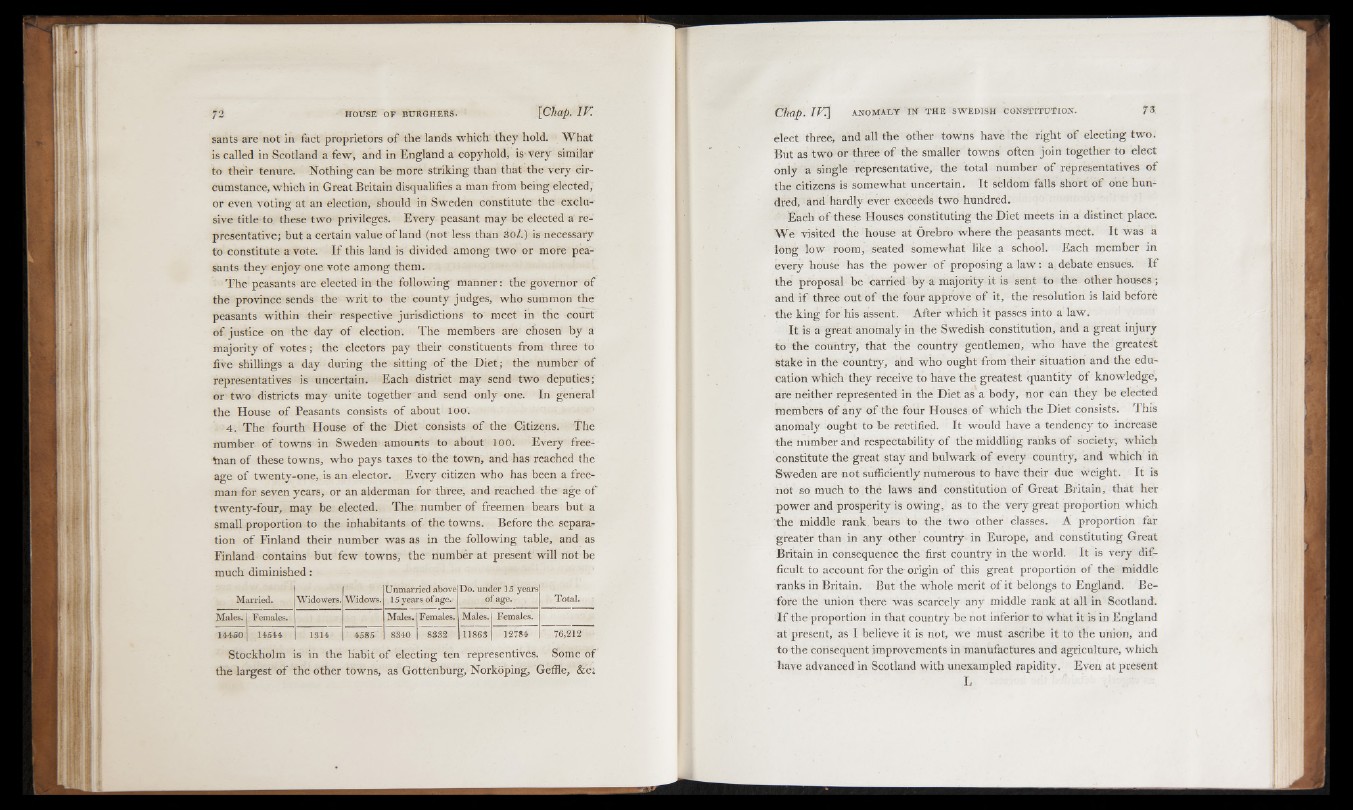
sants are not in fact proprietors of the lands which they hold. What
is called in Scotland a few, and in England a copyhold, isvery similar
to their tenure. Nothing can be more striking than that the very circumstance,
which in Great Britain disqualifies a man from being elected,
or even voting: at an election, should in Sweden O ■ constitute the exclusive
title to these two privileges. Every peasant may be elected a representative;
but a certain value of land (not less than 3oZ.) is necessary
to constitute a vote. I f this land is divided among two or more peasants
they enjoy one vote among them.
The peasants are elected in the following manner: the governor of
the province sends the writ to the county judges, who summon the
peasants within their respective jurisdictions to meet in the court
o f justice on the day of election. The members are chosen by a
majority of votes; the electors pay their constituents from three to
five shillings a day during the sitting of the Diet; the number of
representatives is uncertain. Each district may send two deputies;
or two districts may unite together'and send only one. In general
the House o f Peasants consists of about 100.
4. The fourth House o f the Diet consists o f the Citizens. The
number of towns in Sweden1 amounts to about 100. Every free-
taan of these towns, who pays taxes to the town, and has reached the
age of twenty-one, is an elector. Every citizen who has been a freeman
for seven years, or an alderman for three, and reached the age o f
twenty-four, may be elected. The number of freemen bears but a
small proportion to the inhabitants of the towns. Before the separation
of Finland their number was as in the following table, and as
Finland contains but few towns, the number at present will not be
much diminished:
Married. Widowers. Widows.
Do. under 15 years
Unmarried above
15 years of age. -
of age. Total.
Males. Females. Males. Females. Males. Females.
14450 14544 1314 4585 8340 8332 11863 12784 76,212
Stockholm is in the habit of electing ten representiVes. Some of
the largest of the other towns, as Gottenburg, Norkoping, Geffle, &c;
elect three, and all the other towns have the right of electing two.
But as two or three of the smaller towns often join together to elect
only a single representative, the total number of representatives of
the citizens is somewhat uncertain. It seldom falls short of one hundred,
and hardly ever exceeds two hundred.
Each of these Houses constituting the Diet meets in a distinct place.
We visited the house at Örebro where the peasants meet. It was a
long low room, seated somewhat like a school. Each member in
every house has the power of proposing a law : a debate ensues. I f
the proposal be carried by a majority it is sent to the other houses ;
and i f three out of the four approve o f it, the resolution is laid before
the king for his assent. After which it passes into a law.
It is a great anomaly in the Swedish constitution, and a great injury
to the country, that the country gentlemen, who have the greatest
stake in the country, and who ought from their situation and the education
which they receive to have the greatest quantity of knowledge,
are neither represented in the Diet as a body, nor can they be elected
members o f any of the four Houses o f which the Diet consists. This
anomaly ought to be rectified. It would have a tendency to increase
the number and respectability o f the middling ranks of society, which
constitute the great stay and bulwark of every country, and which in
Sweden are not sufficiently numerous to have their due weight. It is
not so much to the laws and constitution o f Great Britain, that her
power and prosperity is owing, as to the very great proportion which
the middle rank, bears to the two other classes. A proportion far
greater than in any other country in Europe, and constituting Great
Britain in consequence the first country in the world. It is very difficult
to account for the origin of this great proportion of the middle
ranks in Britain. But the whole merit o f it belongs to England. Before
the union there was scarcely any middle rank at all in Scotland.
I f the proportion in that country be not inferior to what it is in England
at present, as I believe it is not, we must ascribe it to the union, and
to the consequent improvements in manufactures and agriculture, which
have advanced in Scotland with unexampled rapidity. Even at present
1